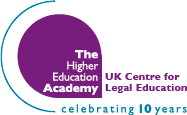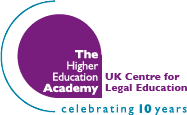Assessment in a rapidly changing world; developing a new discourse

contributors | abstract | presentation | biographies | paper
Contributors
Paul Wynell- Sutherland and Elizabeth Mytton (Southampton Solent University)
Format
Paper presentation
Abstract
The focus of this paper is on assessment and the spheres of influence which shape our thinking as law educators and the implementation of contemporary assessment techniques. The theoretical framework considers first principles such as, ‘Why assess?’Brown, Rust, Gibbs. (1994) Strategies for Diversifying Assessment in Higher Education. Oxford Centre for Staff Developmnent. This is considered against a background of understanding the impact of prevailing external influences and the institutional context from different theoretical perspectives such as ‘perfomativity’Lyotard, J-F. (1984) The Postmodern Condition: A Report on Knowledge. Manchester, MUP. and ‘supercomplexity’.Barnett, R (2000) Realizing the University in an Age of Supercomplexity. SRHE/OUP. Bucks.
The paper also explores the opportunities for a new discourse which better reflects the authenticity of assessment in terms of the self as educator and learner. The paper reviews themes identified in the author’s previous workMytton, E. (2003) Lived experiences of law teachers, in The Law Teacher: International Journal of Legal Education, vol. 37, no. 1. Mytton, E. , Hanson., J,. (2002) W(h)ither the Academic Law Teacher, in The University of Crisis. Rodopi. NY. Mytton, E. (2000) Quality: an epistemological enquiry in West Indian Law Journal, 78-90. Special edition. over the past ten years in relation to spheres of influence on legal education, and reconsiders those themes in the light of recent experience in developing a contemporary assessment strategy together with the implementation of contemporary assessment techniques. The theoretical framework advances themes in relation to being a law educatorMytton, E. Legal education: The Integrated Law School (2005) 4 Web JCLI together with developments in professional academic practice, and how such practice is shaping the dynamics of the learning environment in undergraduate legal education.
Presentation
Short biographies of panel members
Paul Wynell-Sutherland has been a member of the Southampton Solent University Law Group for three years and teaches the following core subjects: Criminal, Contract, Tort and Constitutional and Administrative Law. He also offers units to other degree courses within the Faculty in order to contextualise law and to foster collegiality between law and the other groups. He has recently taken over the role of Mooting Coordinator and is keen to engage students in not only mooting, but negotiation and public speaking which he believes to be essential life skills.
Paul practised as a barrister for many years before transferring to full time academia whilst maintaining his practitioner status; prior to which he served as a Weapons Engineer in the Royal Navy.
Dr Elizabeth Mytton BA (Hons) LLM EdD FHEA FCMI
Having established a career in legal education which spans 25 years, Elizabeth is currently involved with the review and revalidation of the law provision at Southampton Solent University. This has prompted a review of the learning, teaching and assessment strategy as we consider the alignment and engagement of law courses and their vocational relevance in terms of curriculum development and the student learning experience.
Elizabeth is currently Chair of the Committee of Heads of University Law Schools (CHULS), which is acutely aware at this time of the new order in the light of the coalition government’s proposals. In terms of legal education, law schools will be reflecting on what the future holds for educators, students and the sector. Employer engagement will become more significant than ever, as will the measures of student satisfaction with their courses.
Elizabeth’s current research is focussed on the impact of change by developing a new learning, teaching, and assessment discourse which provides currency and relevance in a fast-changing world. This work involves the development and pursuit of new ideas to enhance the student learning experience and enable students to gain the confidence, knowledge and skills to prepare for a successful future.
Elizabeth is interested in the concept of blended learning and how it can be used to complement full and part time study modes whilst enriching the student learning experience.
Last Modified: 31 January 2011



Comments
There are no comments at this time